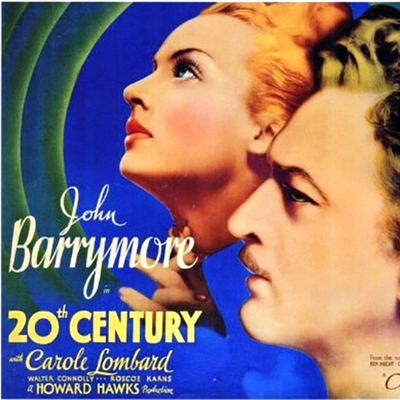Nineteen-thirty-four is probably the crucial year for the screwball comedy genre. It was, of course, the first year for actual enforcement of the Hays Code, so all the rude and scandalous energy in Hollywood pictures since pictures got sound had to find an outlet somewhere. As critic Andrew Sarris once wrote, assuming the voice of a studio screenwriter of the era:
"Here we have all these beautiful people with nothing to do. Let us invent some substitutes for sex. The wisecracks multiply beyond measure, and when audiences tire of verbal sublimation, the performers do cartwheels and pratfalls and make funny expressions."
Or as film historian William K. Everson put it, since "Code comedies couldn't admit to the existence of sex, particularly among unmarried couples, exaggerated comic violence frequently took its place." I like the idea of the screwball as "comic violence", and how in this light some of them were drawing room murder mysteries (My Man Godfrey) while others were action blockbusters (His Girl Friday).
And while there had been comedies that walked and talked like screwballs in the pre-Code years (Platinum Blonde, Trouble in Paradise, Bombshell, Three-Cornered Moon) 1934 saw the release of classic screwballs from the genre's best directors, like Frank Capra (It Happened One Night), W.S. Van Dyke (The Thin Man) and especially Howard Hawks (Twentieth Century).
Hawks had already began making his reputation with films like The Dawn Patrol, Scarface and The Crowd Roars, but Twentieth Century was his first sound comedy, and the one that gave a hint of his talent in the genre. You could, of course, excise comedies from Hawks' filmography and still have a memorable career, but without Bringing Up Baby, His Girl Friday, Ball of Fire, I Was a Male War Bride and Monkey Business he'd have been easier to put squarely in John Ford's shadow.
Twentieth Century began as an unproduced play, Napoleon of Broadway, written by Charles Bruce Milholland about his ordeals working for the famed theatre producer David Belasco. Ben Hecht and Charles MacArthur got their hands on it and their rewrite ran on Broadway for 152 performances.
Columbia Pictures initially wanted Roy Del Ruth (director of the original Maltese Falcon) or Lewis Milestone to direct, but settled on Hawks, who suggested that Hecht and MacArthur rewrite the female lead role – written for Eugenie Leontovich, the aristocratic Russian wife of actor/director Gregory Ratoff (Intermezzo, The Corsican Brothers) – to suit what he described as "Sophie Glotz of Third Avenue".
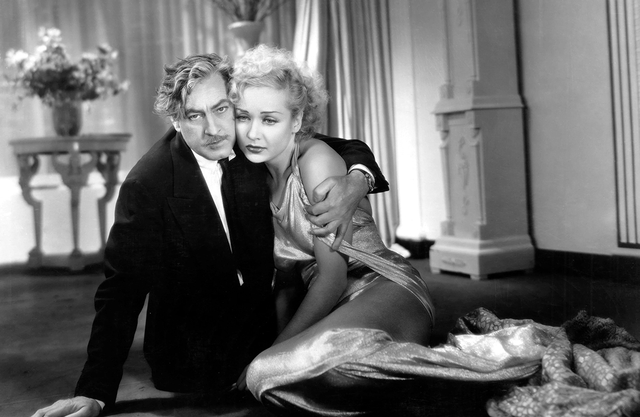
The movie begins on the stage of a Broadway theatre where a read-through is in progress. The rehearsal is being run by Max (Charles Levison), an assistant, and overseen by the two right-hand men of the producer-director – his accountant Oliver (Walter Connolly) and his bibulous press agent O'Malley (Roscoe Karns).
It's obvious to everyone that the weak link in the cast is Lily Garland (Carole Lombard) – a discovery of the producer-director's; a lingerie model whose real name is Mildred Plotka. O'Malley, a Hechtian hosepipe of unending wisecracks, calls her a "Hoboken Cinderella". (What nobody seems to notice is that the play, an antebellum melodrama titled The Heart of Kentucky, is a horrible turkey, but it was compulsory at the time for Hollywood to portray stage properties in the worst possible light.)
Enter the impresario himself, making a grand entrance draped in a scarf. Oscar Jaffe (John Barrymore) is a Broadway legend, a creature of the theatre, an egomaniac and a shameless ham. He begins the rehearsal with an emotionally unctuous speech declaring that, no matter what he says or does in the weeks before the play opens, he truly loves his actors as he loves the stage. Then he sets about terrorizing the apparently talentless Lily for endless hours until she's driven to an emotional breakdown.
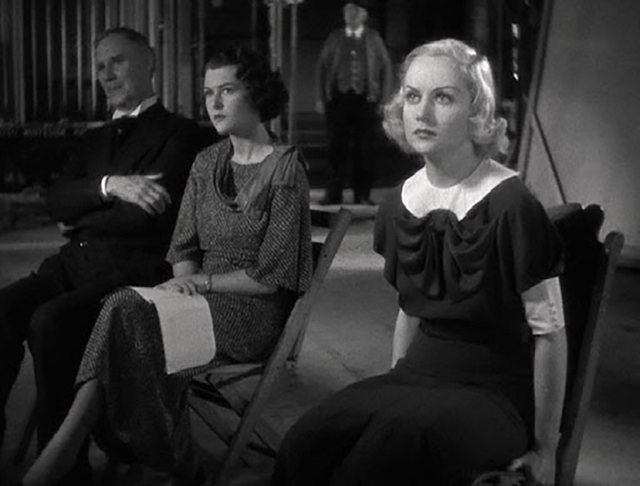
Jaffe is a Svengali whose modus operandi is physical and emotional abuse; requiring Lily to issue a blood-curdling scream, he distracts the exhausted woman by demanding a theatrical pause before he pokes her in the behind with a hairpin. His method might be mad but it works, and he manages to make The Heart of Kentucky a hit and Lily a star.
Cut to three years later and as many hit productions and Lily is living in a luxurious prison, swathed in silk and furs but relentlessly controlled by Jaffe. She tries to break free for a night at a club; he threatens to throw himself out her penthouse window. The next morning he declares that he's turning over a new leaf and has overcome his jealousy, but as she leaves for rehearsal he calls a private detective to tail her and tap her phone.
She discovers his ruse, beats up the detective and takes the first train to Hollywood. Three flops later Jaffe has hit the skids, with the bailiffs seizing the costumes and props from his production of Joan of Arc in Chicago while Lily's face is on every movie magazine. He has to dress up like a southern colonel to evade the sheriffs waiting to arrest him at the train station, and sneaks aboard the Twentieth Century back to New York.
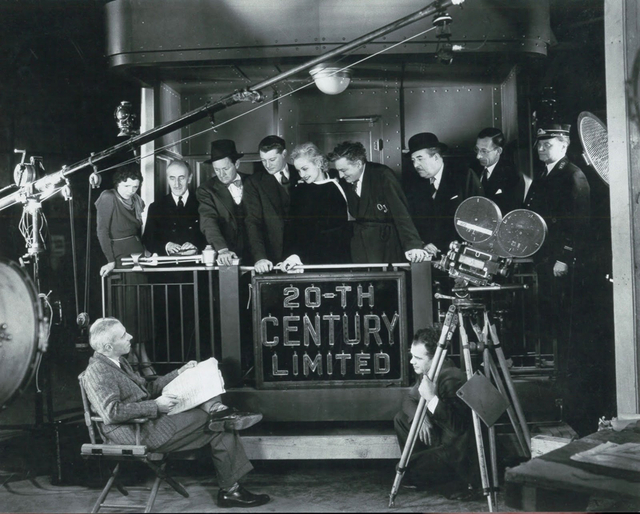
The 20th Century Limited was, in 1934, a legendary express passenger route that ran between LaSalle Street Station in Chicago and Grand Central in New York City. It was inaugurated in 1902 by the New York Central Railroad and ran across five states in 20 hours, though that dropped to 16 hours the year after Hawks' film was released.
Competing with a similar route run by the Pennsylvania Railroad, it focused on the business and luxury market, with curtained berths and private compartments. Passenger lists were published and carnations given to male passengers at boarding, with perfume for women. It was a favorite of movie stars and tycoons; it's the train Cary Grant and Eva Marie Saint ride when he's on the run from the law in Alfred Hitchcock's North by Northwest.
The 20th Century was the most famous of the great routes of the golden age of American trains, alongside the Congressional (NYC to Washington DC), the Daylight (Los Angeles to San Francisco), the Hiawatha (Chicago to various midwestern destinations) and the Super Chief (Chicago to Los Angeles). It ran for the last time in December of 1967; Amtrak's Lake Shore Limited travels along most of its route today from LaSalle Street to Penn Station, but there are no carnations or perfume, and caviar is no longer served at dinner.
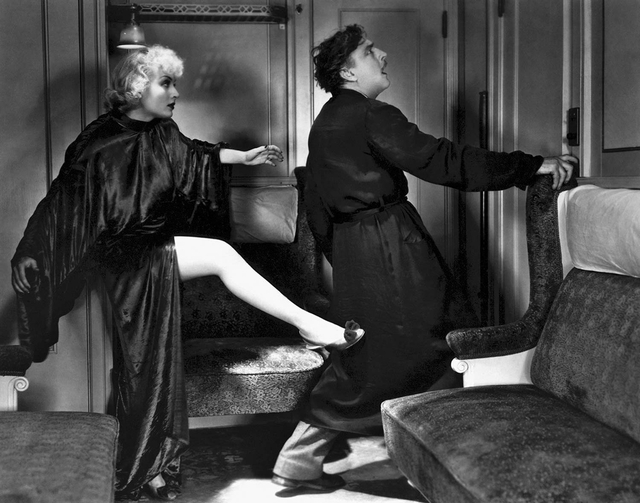
The whole of Hecht and MacArthur's play took place on the train, while Hawks' film rewrote nearly half of the story as a prologue, setting up the characters. No sooner has Jaffe taken off his disguise than Oliver and O'Malley discover that Lily has boarded at Englewood with Smith (Ralph Forbes), her new beau, on her way to New York to star in a play produced by Jaffe's old assistant Max, now a successful impresario after he was fired.
Conventional wisdom holds that Twentieth Century was the film that made Carole Lombard's reputation not just as a comedienne but as a star. She had certainly been plugging away in Hollywood for while, with roles going back to 1921, though much of her celebrity was due to her first marriage to William Powell.
Lombard had appeared opposite her future husband Clark Gable in Wesley Ruggles' proto-screwball No Man of Her Own (1932), and was considered for the role that Claudette Colbert played in It Happened One Night, and had had a hit starring with Bing Crosby in We're Not Dressing before taking the role of Lily. From the distance of decades, it's hard to imagine that nobody could see her comic talent at the time.
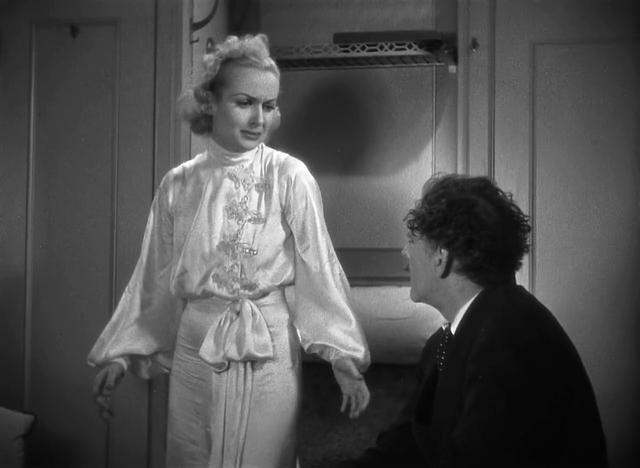
But no less than Hawks, Lombard's second cousin, recalled in Richard Schickel's The Men Who Made the Movies that while she had "a great personality," he thought "she couldn't act for a damn. She just became completely phony." After telling Hawks that he could do better than Lombard, Columbia studio chief Harry Cohn took a week to look around and signed her anyway.
While filming, Hawks recalled, Barrymore "was kind of amazed, she was so bad. He held his nose behind her back and I told the cameraman I'd like to have fifteen minutes off – find a reason and dismiss the people for that time."
Hawks told her that Barrymore had been making fun of her, quoting what he said and asked her what she would do "if a man said such-and-such a thing to you?"
"I'd kick him right in the groin," the famously earthy Lombard replied.
Hawks told her to try it during their next take, and that if she didn't "I'm going to fire you and get another girl."
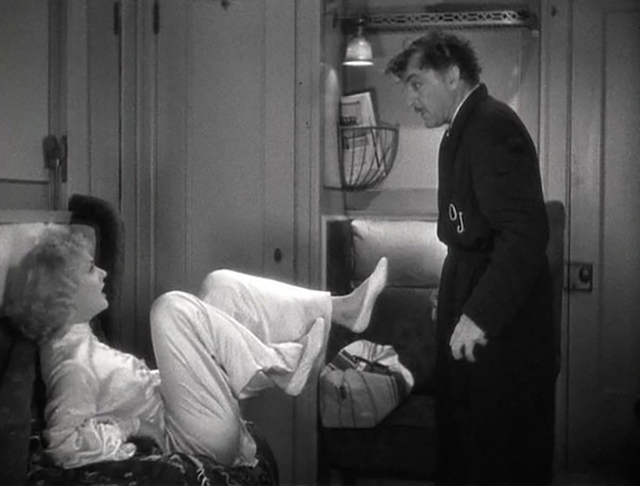
The scene they shot is one of the film's most chaotic, Barrymore looming over Lombard, lunging and jabbing with his finger while she kicks at him, her back against the train compartment's bench. After three years apart their resentment and anger at each other explodes, and both actors sell the comic violence.
Lombard, James Harvey writes in Romantic Comedies in Hollywood from Lubitsch to Sturges, "is like a comic maenad in this film. That revolving of her feet in the air not only looks funny, as it's meant to, it feels inspired, a detail as natural and relieving as the choked cries of attack that accompany it. (Whenever Lombard began a new film after that, she would send Howard Hawks the message: 'I'm going to start kicking him!') The heroine of Twentieth Century may have been drawn, as the movie reviews noted, without redeeming qualities, but Lombard gives her a redeeming recklessness."
Barrymore, Hawks recalled, "came back and said, 'That was magnificent. Were you fooling me the whole time?' And she started to cry and ran off the stage. He said, 'What the hell goes on, Howard?' And I told him. 'Well,' he said, 'this girl is absolutely marvelous.' I said, 'She is a star. But I need a lot of help from you.' We made the picture in three weeks. And she was a star after that."
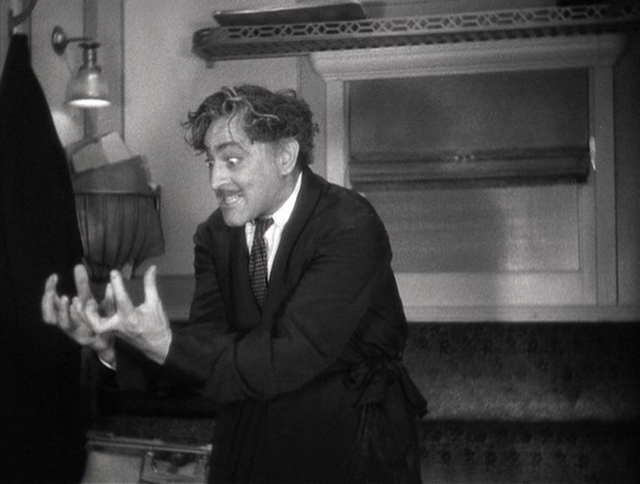
Hawks said he went to Barrymore's house to try to talk him into taking the role of Jaffe. "Just why do you think I could play this?" he asked the director.
"Well, you're the biggest ham in the world and there is no reason why you can't play this thing because this is the story of the next greatest ham," Hawks replied.
"All right," Barrymore said. "When do we start?"
Barrymore was a legend, the biggest name in the second generation of an acting dynasty whose movie career began before the First World War and had managed to survive the transition to talkies. He had appeared opposite Garbo (among others) in Grand Hotel and starred in A Bill of Divorcement, Katharine Hepburn's screen debut, both in 1932. The next year brought Topaze, with Myrna Loy, and another star-studded bill in George Cukor's Dinner at Eight, with Jean Harlow, Wallace Beery and his brother Lionel.
His Jaffe is never far from manic, a narcissist who needs almost no encouragement to flights of grandiose fantasy. The train to New York is peopled with the sorts of characters you'd expect in Screwball World, including Clark, an asylum escapee (Etienne Girardot) and a pair of bearded trolls representing the Oberammergau Passion Play, who inspire Jaffe to try to lure Lily back under his marquee to play Mary Magdalene in an outlandish production featuring a snake dance, a Babylonian banquet, sand imported from the Holy Land and the Emperor Nero.
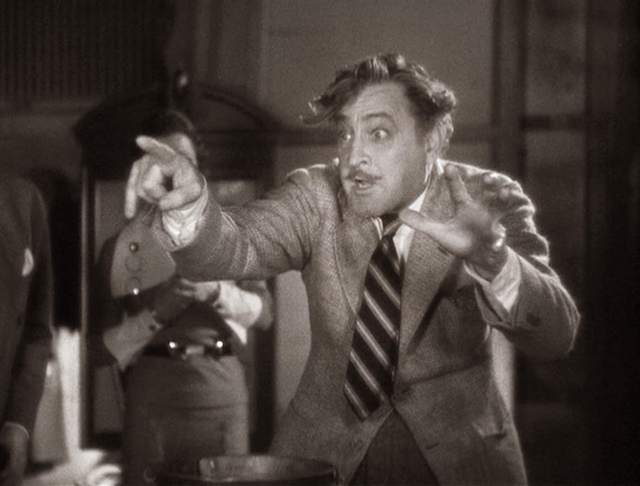
"Can you see her, Lily?" he says, describing her playing the Magdalene. "This little wanton ending up in tears at the foot of the cross. I'm going to have Judas strangle himself with her hair."
Barrymore plays Jaffe like a cartoon, turning from solemn and portentous one minute to a cackling fiend the next. Lombard has to match his energy if she's going to convince us – as she must – that they're perfect for each other, a codependent Pygmalion and his Trilby whose compulsion to overdramatize every moment of their lives is only tolerable in each other's company.
"They are both playing in the same familiar theatrical style," writes Harvey. "Two roaring phonies in a comedy of hammy exaggeration and hysterical excess." The film is proof of comedy's darkest truth – that the best comedy is cruel and can succeed without any sympathetic characters. That it is, in essence, about bad things happening to bad people.
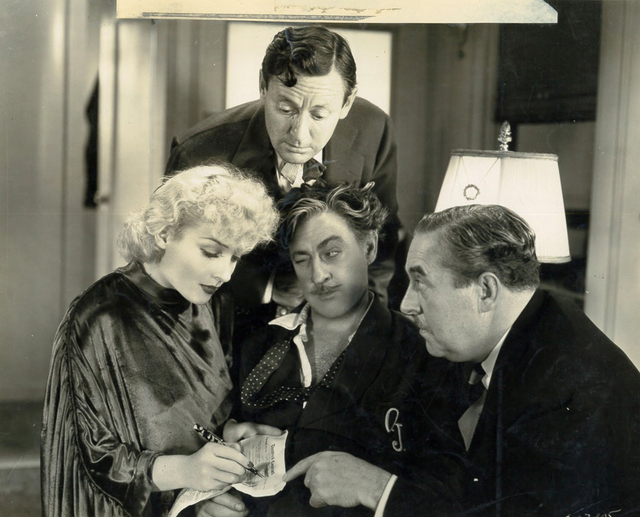
Twentieth Century opened to decent reviews and disappointing box office but it didn't do much to impede Hawks, who made four films in the next two years before taking a break for a year and coming back with Bringing Up Baby in 1938, Only Angels Have Wings in 1939 and His Girl Friday in 1940, the last of which had a plot that echoed Twentieth Century – a temperamental egomaniac trying to save his career by luring back his diva ex.
Lombard fared even better, an undisputed star now whose name could open a film – and the next few years would see her compete with Myrna Loy, Claudette Colbert and Irene Dunne as the queen of screwball, in films like The Gay Bride, Hands Across the Table, My Man Godfrey, Nothing Sacred and True Confession. Married to Clark Gable, she was queen to the King of Hollywood, but waiting for her was that ill-fated Victory Bond tour.
She'd never work again with Hawks, her second cousin, but she did get Barrymore a part in True Confession, as an obnoxious loon obsessed with murder trials. It was a break Barrymore needed – his private life was tabloid fodder and he was constantly forgetting his lines on set, and even the character he was playing. His alcoholism seemed the least of his problems, but it would kill him nonetheless, after collapsing while recording lines for Rudy Vallee's NBC radio program, just five months after the plane crash that killed Lombard.
Club members can let Rick know what they think by logging in and sharing in the comments below, as access to the comments section is one of many benefits that comes along with membership in the Mark Steyn Club.

